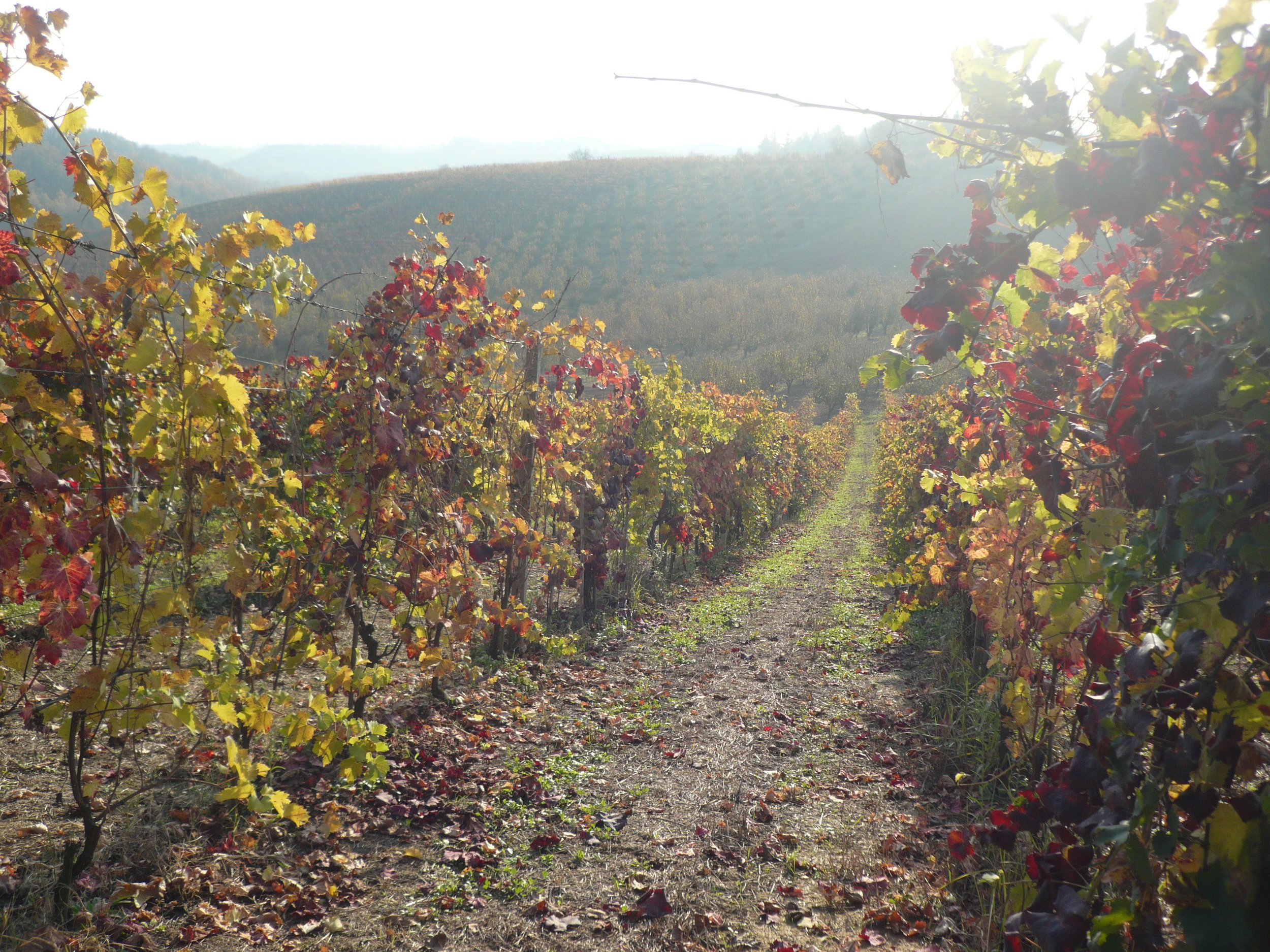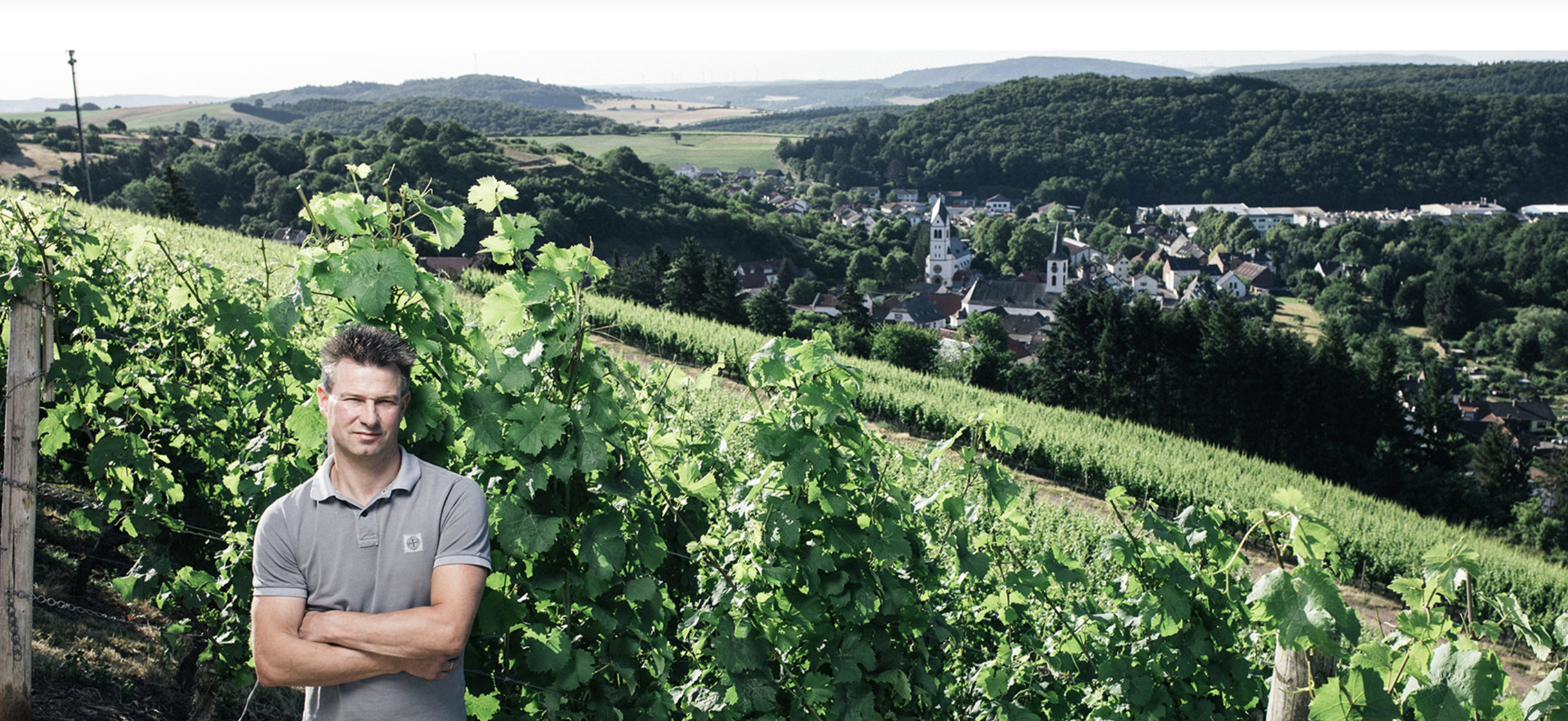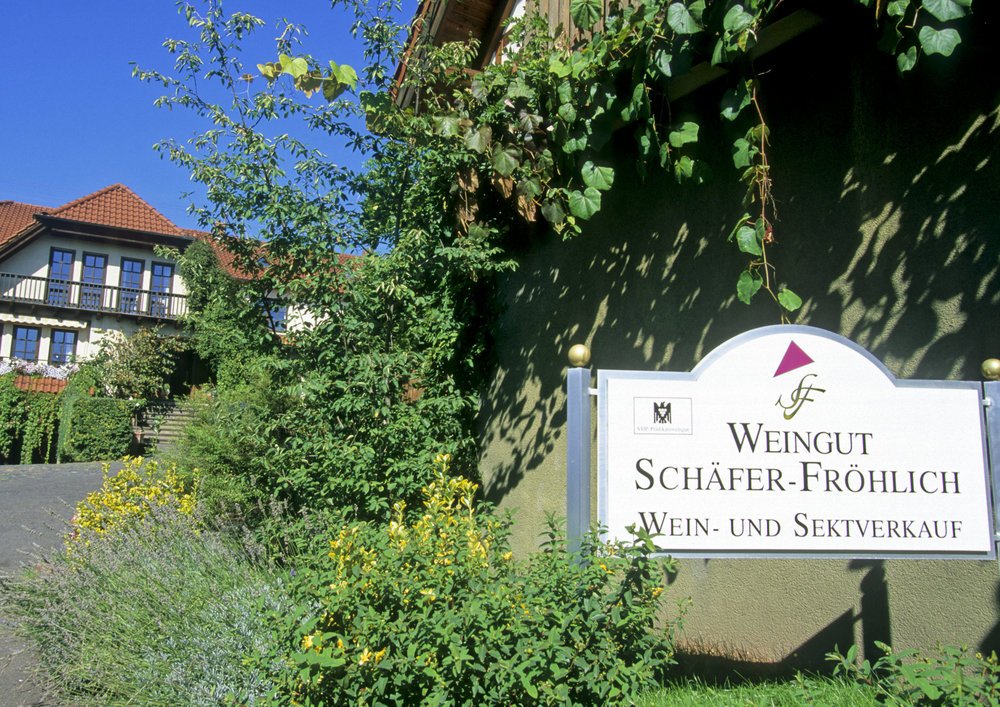
Schäfer-Fröhlich
Bockenau, Nahe, Germany




The Fröhlich family has been cultivating vines since 1800 though Weingut Schäfer-Fröhlich was founded in the 1970s through marriage. In the early 1990s, the extraordinarily talented Tim Fröhlich took over the family estate and made his first vintage in 1995.
Rudi Wiest was introduced to Tim by Helmut Dönnhoff who told him there was a young man doing some extraordinary work in the village of Bockenau, an area not known for producing noteworthy wines. Fast forward ten years and Tim Fröhlich was chosen newcomer of the year by The Gault-Millau/German Wine Guide. By 2010, he was selected as winemaker of the year by the same guide; the youngest ever to receive such acclaim. Tim stepped into a virtually unknown estate and shaped it into one of the top Nahe estates in a very short period of time.
The outstanding steep vineyard sites are the foundation for unmistakable, authentic wines. In conjunction with these great sites, the recipe for Tim’s success consist of low yields, painstaking vineyard management, a strong adherence to wild yeast fermentation, a focus on minerality, and an almost unnerving perfectionism in the cellar. Oh, and did we mention that he’s rock star handsome? Ridiculous.
Weingut Schäfer-Fröhlich totals 21 hectares today, of which 18 hectares is accounted for by Riesling. 82% of the production is dry.
Bockenauer Felseneck - Blue Devonian slate, basalt and quartz
Schlossbockelheimer Felsenberg - Weathered volcanic porphyry soils and quartz
Schlossbockelheimer Kupfergrube - Weathered volcanic porphyry soils
Monzinger Halenberg - Blue slate, gravel and quartz
Monzinger Frühlingsplätzchen - Red slate, gravel and quartz
80% Riesling, 10% Pinot Blanc, 7% Pinot Noir, 3% other grape varieties.
Much of the success was the result of a number of smart acquisitions made by Tim in some of the best vineyards in the region, which nearly doubled the family’s original holdings. He then went on to become a terroir fanatic; developing the best methods to extract the perfect expression of fruit from each of his six Grosses Gewachs classified vineyards. Of considerable note are the blue slate, loess (fine silty sediment) and loam (sand, silt, clay blend) soils of the Felseneck vineyard, considered one of Tim’s most prized holdings, and a virtually unknown location before he started working with it. Schäfer- Fröhlich is making Rieslings as great, or better than, (dare we say it?) any producers in the Nahe. These are some of the most impressive and exciting white wines being crafted anywhere today.
Stephan Reinhardt writes: "As for his Rieslings, even the dry village/terroir wines are gorgeous here and have more expression than many German GG Rieslings. The Felseneck GG is probably one of the finest dry Rieslings produced in Germany so far. I can hardly think of more precision, finesse and elegance in dry Nahe Rieslings. More than this, the sweet predicate wines from this steep, dark slate site are also great wines that deserve all your attention. More and more, Tim's Felseneck is becoming a glorious single-vineyard site that offers the finest Nahe Rieslings along with the Hermannshöhle and the Halenberg, the latter of which is always more compact and powerful but less filigreed compared to the other two aristocrats."
Our Selections
Schäfer-Fröhlich Blanc de Noir (Spätburgunder) Rosé 2024
Known for his electric Rieslings and precise Pinot Blancs, Tim Fröhlich brings the same mastery to this Blanc de Noir. Sourced from 40+ year-old Spätburgunder vines on Stromberg’s ultra-steep volcanic slopes, the wine is made entirely from free-run juice, with no skin contact. Fermented in stainless steel and aged in a mix of steel and halbstück (600L barrels), it shows a pale ivory hue that signals its freshness. The texture, tension, and minerality are extraordinary—this is easily one of the finest Blanc de Noirs we've tasted.
11.5% ABV | 6.2 g/l RS | 7.6 g/l TA
Schäfer-Fröhlich Riesling Estate Dry 2023
The 2023 Riesling was harvested across the entire spectrum of sites, from younger vines up to 15 years old in Minzingen, Schlossböckelheim and Bockenau. It was primarily fermented in stainless steel with a small portion of large wood.
This is the house’s calling card: perfectly delineated dry riesling from both porphyry and blue Devonian slate. Wonderfully aromatic yellow stone fruits, herbs, and minerality. The palate is riveting for an entry-level estate wine. Crystalline is an understatement.
Alcohol: 11.5% | Acidity: 8.1 g/l | RS: 5.1 g/l
Schäfer-Fröhlich Riesling Kabinett Felseneck 2023
The 2023 Riesling Kabinett Felseneck was harvested from 50-60% south-facing slopes which see little morning sunlight but extended sunlight in the afternoon and early evening. Soils are primarily Devonian slate and quartzites.
Immaculate balance between the acid and RS here. Tim is known for his dry GGs but shows real mastery in the Prädikat realm. Golden-yellow fruits accented by fresh green and citrus flavors.
Alcohol: 7.5% | Acidity: 9.5 g/l | RS: 55.0 g/l
Schäfer-Fröhlich Riesling Dry Vulkangestein 2023
Vulkangestein is made from 30 year-old vines planted on weathered volcanic porphyry soils and quartz in the grand cru vineyards Felsenberg and Stromberg. Fermented naturally in a combination of 600 liter halbstück barrels and stainless steel tanks.
Both smoky and fruity, with tropical notes accented by citrus. Impeccable balance with a textured palate and a stony, almost salty, finish.
Alcohol: 12.5% | Acidity: 7.8 g/l | RS 4.2 g/l
Schäfer-Fröhlich Riesling Dry Schiefergestein 2022
Schiefergestein comes from vineyards of slate in Bockenau and Monger as well as younger vines from the grand cru of Felseneck, planted to soils of blue Devonian slate, basalt and quartz. No added yeasts. Healthy grapes means less SO2 and this hovers around 43mg. 25-30 year old vines. Flinty, slatey and spicy on the palate.
“The 2022 Riesling Schiefergestein is made from the 20-30-year-old vines in the Bockenauer Felseneck. A very light and poor soil explains the filigree nature of the wines. The nose is still full of yeasty funk, but a zesty citrus world opens underneath with a pure, streak of pale lemon peel that is strait-laced, stony, and thrilling. This is lightness and depth in a disarming citrus package. The 2022 is slender, taut, and crystalline.” 93pts VM — Anne Krebiehl MW July 2023.
Schäfer-Fröhlich Riesling Felseneck GG 2023
If Tim Frohlich had a “flagship” wine, it might be the Bockenauer Felseneck Grosses Gewächs. Made from his oldest and steepest vineyards planted on Devonian slate and quartzite, with vine age of 60-65 years old on 30-65% south-facing slopes.
“The 2023 Riesling Bockenauer Felseneck Grosses Gewachs, from blue Devonian Slate, has immediate spice and slate savor, like citrus squeezed on dry stone — fragrant, lifted, soaring. The palate is as fine as a flexible blade sharp and precise. Nothing here is about power or muscle. Everything is about grace, direction and finesse. If you want definition without weight, this is your wine. The citric dimensions reverberate and zestiness rules. What poise, what elegance. Wow.” (96-98) — Anne Krebiehl MW
Alcohol: 12.5% | Acidity: 7.4 g/l | RS 3.9 g/l
2022 Vintage Also Available
Schäfer-Fröhlich Riesling Felsenberg GG 2023
Frohlich’s Schlossböckelheimer Felsenberg Grosses Gewächs is made from three terraced parcels planted on volcanic Porphyric soils. With steep slopes (40-60% grade) and protection provided by a small mountain range, Felsenberg is spared the cold winds maintains good heat retention.
“Wet Stone, smoke, and petrichor give this a fragrant nature, almost devoid of fruit yet colored with creaminess and citurs. The palate is similarly austere, almost bare, yet it is a true and unadulterated picture of Riesling. So taut, so thrilling, so slender, it’s rapier-like in its uncompromising stoniness yet elegant in all its precision”. 95-97pts VM — Anne Krebiehl MW July 2024.
Alcohol: 12.5% | Acidity: 6.9 g/l | RS 3.3 g/l
2022 Vintage Also Available
Schäfer-Fröhlich Riesling Stromberg GG 2023
The Bockenauer Stromberg Grosses Gewächs is sourced from some extreme vineyards: 40-70% grade slopes on volcanic soils. Here the vines are up to 100 years old, with many 80-90 years-old.
“Chervil, lemon blossom and pale lemon zest come together on the fragrant nose. Equal fragrance defines the palate in its litheness, directness and absolute finesse. Gorgeous understatement allows us to see the naked purity of this stony wine. Beautiful, taut and crystalline, this is exquisitely and deliciously hair-raising”. 96-98pts VM — Anne Krebiehl MW July 2024.
Alcohol: 12.5% | Acidity: 7.9 g/l | RS 4.5 g/l
2022 Vintage Also Available
Schäfer-Fröhlich Riesling Frühlingsplätzchen GG 2023
The Monzinger Frühlingsplätzchen Grosses Gewächs is from Frohlich’s only site of Permian rhyolite (weathered red slate) on a south/southwest-facing slope. The 50 year-old vines see Intense sunlight and strong winds here.
“While reduction still swings along, there is passion fruit foliage on this intriguing nose. The palate is light, zesty with pale lemon peel, clear as a bell, bright and wonderfully straight -laced. It’s linear and somehow also gentle.” 94-96pts VM — Anne Krebiehl MW July 2024.
Alcohol: 12.5% | Acidity: 6.8 g/l | RS 3.3 g/l
2022 Vintage Also Available









